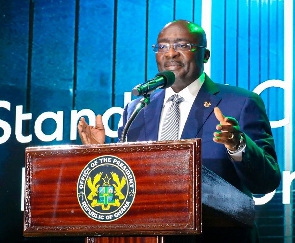 Vice President, Dr. Mahamudu Bawumia
Vice President, Dr. Mahamudu Bawumia
Government says Ghanaian industries have the capacity to produce goods to help reduce the country’s import dependency and facilitate the economic transformation agenda.
At the Association of Ghana Industries (AGI’s) 11th Quality and Industry Awards in Accra on Saturday, Vice President Mahamudu Bawumia recounted the production capacity of local industries during the COVID-19 pandemic, which could provide some solutions to tackling the current economic difficulties.
He said the personal protective equipment (PPE) and other materials produced to meet local demands attested to the fact that the country must look inward for solutions.
“When we had COVID-19, and we had to produce sanitizers and PPE, which we had not done before, Ghanaian industries proved that they could do it, and we did it,” he said.
“A lot of the things that are happening out there, our own companies can do it right here. So, all the digitalisation projects including Ghana-Card, mobile money interoperability payment system, digital address system and universal QR code have been done by Ghanaian ICTs.”
“I believe that as we’re going to depend more on ourselves in this new normal, we have to support Ghanaian industries to help support the economy, and the capacity exist for us to produce many goods that we should never import.”
Dr Bawumia said through a collective effort, the Ghanaian economy would be transformed from import-dependent to export-driven, and identified agriculture, agribusiness, and manufacturing as critical areas to deepen such collaborations.
He said government was exploiting public-private partnership to boost industrial development through programmes and policies such as the One-District, One-Factory and digitalisation initiatives.
Global and local developments such as the impact of the COVID-19 pandemic, inflationary pressures, lack of access to the capital market, and unsustainable debt, had made things challenging for the economy and businesses.
Vice President Bawumia expressed the belief that the Government’s programme with the International Monetary Fund (IMF), when implemented, would help the restoration of debt and fiscal sustainability.
The programme would “provide us the space and resources to undertake the critical reforms to put Ghana back on the path of fiscal debt sustainability,” he said.
On the current depreciation of the cedi against the major currencies, particularly the US dollar, and its attendant effects on the economy, Dr Bawumia said the introduction of the gold purchase programme would help reverse the trend.
Beginning the first quarter of 2023 the Government would implement a policy that would enable Ghana to trade her gold to buy oil products into the country.
“If we implement it as we envision, it will fundamentally change our balance of payment and significantly reduce the persistent depreciation of our currency with its associated increases in fuel, electricity, water, transport and food prices,” he assured.
Dr Humphrey Ayi-Darke, the President of AGI, in his welcome remarks, said beyond the 2023 Budget and expected IMF interventions, it was important that public-private dialogues were held to advance policies to engender a better future for Ghanaian industries.
“We continue to urge government to work closely with the AGI to develop long-term strategies that will bolster our industrial transformation agenda.”
On the current economic hardship, Dr Ayi-Darke urged industries to rethink the way forward and align with emerging trends to make progress.